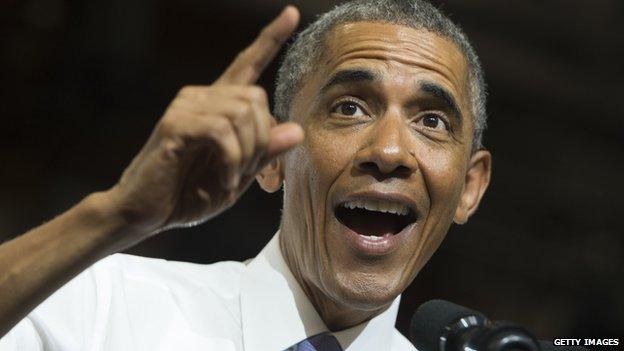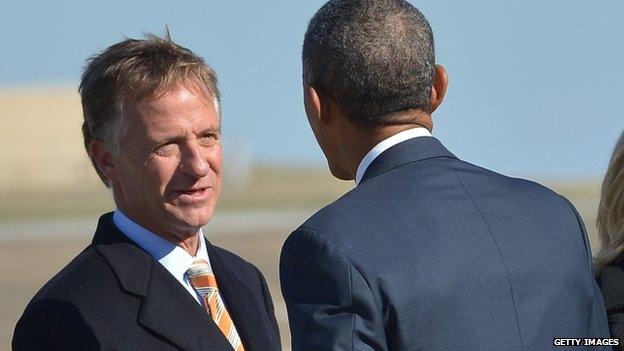Obama's 'free community college' proposal
- Published
- comments

President Barack Obama has proposed, external that the government pay for two years of community college tuition for every American with an interest in progressing toward a degree and sufficient academic marks.
The US community college system, which includes 1,600 campuses across the country, provides two-year associate degrees and often allows students to apply academic credits toward bachelor's degrees at traditional four-year US universities.
According to, external the American Association of Community Colleges, more than 12.8 million Americans studied at community colleges in 2012, with 7.7 million taking courses for credit toward a degree.
The White House says if the plan were adopted by all 50 states - which would be required to fund 25% of the costs, while the federal government shoulders the rest - it would save the average community college enrollee $3,800 [£2,500] in tuition per year and cover about 9 million students.
"It's something that we can accomplish, and it's something that will train our workforce so we can compete with anybody in the world," the president said.
A White House official said, external the plan would cost $60b [£40bn] over 10 years - and, as Republican Speaker of the House John Boehner's spokesperson quickly pointed out, the president did not propose how to come up with the funds.
"With no details or information on the cost, this seems more like a talking point than a plan," Cory Fritz said, external in a press statement.
Despite Mr Fritz's scepticism, the plan may be able to garner some bipartisan support. It's based on a Tennessee programme devised by Republican Governor Bill Haslam, who will join the president and the state's two Republican senators when Mr Obama speaks about the proposal in Tennessee on Friday.

Barack Obama's tuition plan is based on a Tennessee programme enacted by Governor Bill Haslam
Gary Stix of Scientific American says, external that the proposal is an "idea whose time has come".
"Free two-year colleges would serve as a concrete measure directed toward giving people the skills for better jobs - many of them in the science and technology arena," he writes. "It would also be a small step to help narrow economic disparities, an issue that consumes so much political and academic debate."
The New York Times's David Leonhardt says, external the potential impact of the proposal is "huge".
"Battles over healthcare, immigration, gun control and other issues may attract more attention," he writes. "But both history and economics suggest that nothing may have a greater effect on the future of living standards than education policy."
He continues:
"The unemployment rate for college graduates is far lower than for everyone else. The pay gap between college graduates and everyone else is at a record high. The countries that have reversed history and made more educational progress in recent years than the United States have also experienced faster income growth. In a globalised, high-tech economy, education - the process by which people learn new skills - has a return on investment like nothing else."
While there are some "significant concerns", writes, external Washington Monthly's Robert Kelchen, the plan will help convince Americans that community college is affordable, steer students away from more expensive for-profit schools and provide help to middle-income families who don't already qualify for government aid.
Some conservatives groused at the president's use of the word "free" to describe the proposal, however.
"'Free' should always be in scare quotes, because it won't be free at all," writes, external HotAir's Ed Morrissey.
"The latest entitlement proposal comes off the long and hoary list of progressive hobby horses, a giveaway that benefits students and even more the teachers needed to fill the sudden demand the erasure of pricing signals will create. The bill will get picked up by the taxpayers, to the tune of tens of billions of dollars."
The proposal will actually drive up the cost of tuition, he says, by increasing demand - "just as we have seen with college loan programmes".
"We will have expanded rather than solved the higher-education bubble," he concludes.
Fortunately, writes, external Rick Moran in the American Thinker, the proposal is going nowhere.
"The media will whine about denying 'free' tuition to poor people without seeing the stupidity of not realising that someone, somewhere has to pay for it," he says. "But this is typical Obama blather - a grandiose sounding plan with no concept of how much it will cost or how it will be paid for."
Several writers are comparing, external this latest presidential proposal to the universal preschool plan Mr Obama floated in his 2014 State of the Union address, with USA Today's Gregory Korte calling them, external the "bookends" of the presidents education policy.
"That $75bn proposal, which relied on dwindling tobacco tax money to provide federal matching funds, never got traction in Congress," writes USA Today's Gregory Korte.
Unless politics in Washington have changed in the past year, Mr Obama's community college proposal may meet a similar fate, leaving his education legacy to stand without help from its ambitious bookends.